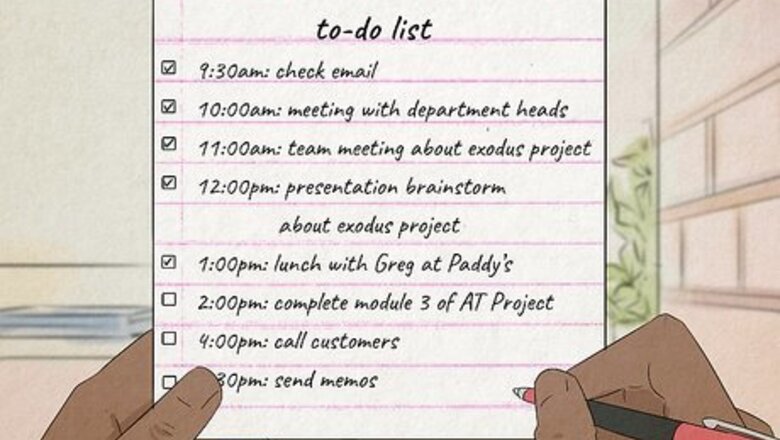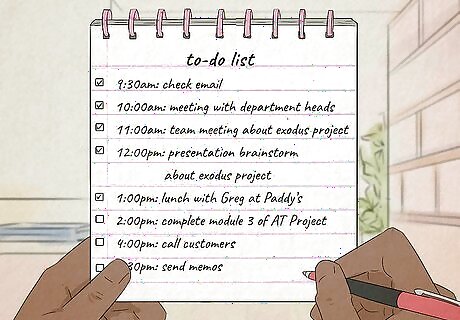
views
Work efficiently throughout the week.

Create a system for yourself so you can be productive. You might write out a to-do list, so you can keep track of what you’ve accomplished and what still needs to be done. You could also set time limits for different tasks, so you don’t spend too much time on a single project. Whatever you do, organizational and time management systems can help you consistently hand in high-quality, punctual work. For instance, you might manage your schedule with an online calendar, so you can review all your upcoming due dates. You could spend 15 minutes each night planning your to-do list for the following day. You might set a timer for yourself so you don’t spend too much time on a single task. You could set a personal productivity goal for yourself each day. For instance, you might say “I want to finish 30 invoices today” or “I want to finish and send out this memo.”
Go the extra mile.
Look for small ways to help your boss. You might hand in an assignment a little early, or take extra time to get ready before a meeting. You could even offer to take on extra projects, if you think they’d be manageable. Your boss will appreciate the extra help, and may keep you in mind for future promotions and opportunities.
For example, you might check in with your boss each week to see if they need extra help with an assignment. You might offer to come in early or stay late to help with some extra projects. You could reply to your boss’s emails really quickly, so they know you’re efficient and reliable. If you really want to go the extra mile, spend time helping your co-workers, too. You might lend a hand on a big project, or offer to take a few tasks off their to-do list.
Make new opportunities.

Offer suggestions and ideas to your superiors. Spend time researching helpful, innovative ideas for your workplace. Then, present the new idea to your manager and offer to take the lead on the project you’ve created. Your boss may appreciate you taking initiative! You might say, “I’ve brainstormed a few different ways to advertise for the upcoming 5K. Would it be okay if I spent tomorrow updating our social media accounts and making an Eventbrite page?” You could suggest, “I’ve come up with a new way to organize all our invoices. Would I be allowed to tackle this tomorrow?” You could say, “I thought of a few ways we could increase our audience engagement on social media. Could I try making a few posts on our accounts and see how it goes?” You might offer, “I noticed that we don’t have a first-aid kit around here. Would it be okay if I put something together?”
Highlight your achievements.

You can point out your accomplishments without sounding arrogant. At the end of the week, you might highlight and summarize your work week in a quick email to your boss. Or, you could be more vocal in a meeting about a new project you’re working on. Subtle statements are great ways to prove your worth without sounding arrogant. You might say, “This past week, I organized and queued the company’s social media calendars for the next 3 months” or “I recorded all of the company’s transactions in the master spreadsheet.” You could also say, “Over the past 2 weeks, I’ve researched social media keywords that better match our target customer base.”
Act like a team player.

Thank and acknowledge your teammates for all their help. It’s great to highlight your own achievements, but it’s also important to boost morale, too. In a big project, remind your co-workers about what they accomplished, as well. This kind gesture will help you stand out, and leave a positive impression in everyone’s minds. You might say, “This fundraiser was a huge team effort. I couldn’t have done it without you guys” or “This really is a team victory. Thank you all for your hard work!”
Adapt to your boss’s management style.

Flex to your manager's work style and approach. Pay attention to the way your manager runs things around the workplace—are they more direct, or do they tend to take a step back? You’re more likely to prove your worth if you align with their approach. When it comes to showing your value at work, it really is about understanding what's important to those stakeholders in terms of performance and expectations and delivering upon those expectations. For example, if your boss likes to be kept in the loop, you might send them a daily email update. If your boss is more laid-back, you might pop in their office once a week. For a more hands-on boss, you might say, “Here’s everything I accomplished today!” For a more relaxed boss, you could say, “This is what I’ve worked on over the past 2 weeks.” Feel free to ask your boss what their personal preferences are, too. You might say, “I just wanted to check in regarding this latest assignment. Would you like daily updates, or do you want me to email you once I’m done?”
Be polite.

Try not to initiate arguments or heated discussions. These can be stressful for the entire workplace, and won’t make a very positive impression. Instead, do your best to settle your differences in a polite, civil way. Your co-workers and superiors will appreciate your transparent, hands-on attitude. Instead of saying “I can’t believe you forgot to email me the project files,” say something like, “Sorry to nag you, but could you send me those project files today?” You might say, “I feel like you’ve been avoiding me all week, and I just want to clear the air. Did I do something to upset you?”
Share positivity.

Brighten people’s days with uplifting, happy comments. Share a fun video that you watched, or something positive you heard on the news. Even small acts of kindness and positivity can really make a difference in the long run. You could say, “I saw the funniest cat video on my Facebook feed last night. Could I send it to you?” or “My sister sent me such a ridiculous meme last night. It’s really silly, but I still got a laugh out of it. Mind if I sent it your way?” You might bring your co-worker a cup of coffee, or bring in a box of donuts for everyone to enjoy.
Mentor someone.

Mentors and mentees are great for any workplace environment. Superiors love to see their employees sharing their experiences and insights with less experienced workers. If you have some free time, offer a helping hand to an employee who’s still learning the basics. They’ll appreciate the extra help and insight, especially if they’re brand new. You might say, “Hi there! I just wanted to officially welcome you to the team. If you need any help learning the ropes, please let me know!” You could also say, “How are things going? I’d be happy to walk you through the employee handbook, if you’d like.”
Ask for help.

Needing help doesn’t make you weak or inexperienced. If anything, asking for help proves that you prioritize your work quality over your own personal pride. An experienced co-worker or boss will be happy to explain how things work, and will appreciate your honesty and integrity. For example, you might say, “Hey Caitlin! Would you mind walking me through the vector mask function in Adobe Photoshop?” or “David, could you show me how to make a new database in Microsoft Access?”
Say no if you need to.

Don’t take on more than you can handle. You won’t make a good impression if you spread yourself thin and submit low-quality work. Instead, take a close look at your workload and step back from projects that are a bit too stressful. Your boss may appreciate your honesty and integrity, which can help you stand out. You might say, “I’d love to work on that, but this week’s data entry is really taking over my schedule. Could someone else cover that task for now?” You could always compromise, saying something like, “I’m really swamped this week, but I’ll have more free time next week after our publication deadline. Could I start then?”
Create a work-life balance.

No one likes an overworked, exhausted employee. To really prove your worth, draw a line in the sand between your working hours and personal time. Don’t take working vacations or spend long hours working overtime. If you are refreshed, happy, and productive, your boss is sure to take notice. Instead of finishing up extra work at home, catch up on your favorite TV show or read a chapter of your favorite book. Instead of staying late at work, set firm “clock in” and “clock out” times for yourself.




















Comments
0 comment